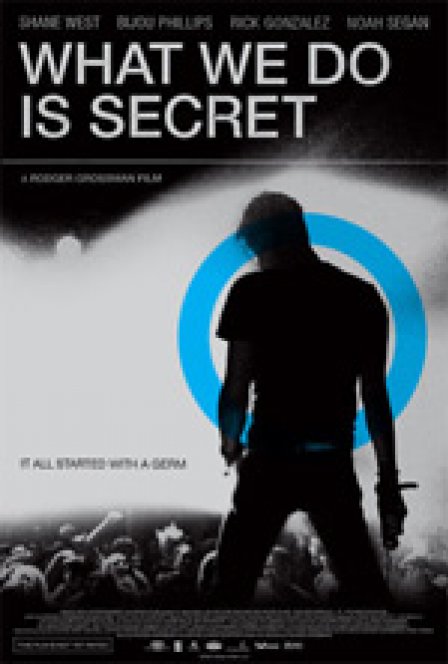Darby Crash, the frontman of seminal LA punk band The Germs, established his place in history by showing what can be accomplished by placing vision and ambition above technical virtuosity, forming a group that booked gigs and hyping its reputation for rambunctiousness before actually learning to play instruments. It's a shame, then, that filmmaker Rodger Grossman, similarly green at his craft, opted to do the opposite. What We Do Is Secret, Grossman's biopic of Crash (played by Shane West), mirrors the band's lack of skill and talent, but the off-setting vision and ambition are nowhere to be found. In their place are predictability and rote formulas straight out of the made-for-cable handbook.
Secret wastes no time firing up its cliché fest, launching into reality-TV-style confessional shots of Crash's bandmates and other associates talking up, in very unsubtle terms, what a wild and wacky visionary he was, but also how there was always an element of danger to it. The difference between these scenes and their counterparts in MTV's The Real World is that as annoying as it can be to watch naive, pontificating brats prattle on about their half-baked worldviews, it's actually a lot worse to watch really bad actors playing naive, pontificating brats prattling on about their half-baked worldviews.
Please bear in mind two things: (1) I love early LA hardcore punk, and (2) while The Germs aren't my favorite band from that scene, I do like them and recognize their significance, and I went into this movie wanting to learn more about them. That said, most biographies and documentaries of early American punk that I've encountered focus less on the "genius" behind their craft and more on the wonder of very average kids finding an outlet to express themselves and vent their outrage after seeing through the mirage of suburban utopia. Bands like The Minutemen, for example, who were the subject of the outstanding 2005 documentary We Jam Econo, were fairly normal, nondescript California teenagers who had something to say and decided to help carve out a platform from which to say it.
Secret insists on pumping up Crash as some sort of under-appreciated rock ‘n’ roll hero, who mapped out a manifesto for immortality that entailed raising hell in LA punk clubs for a few years, getting banned everywhere, making a high-impact record, and then offing himself, which would signify, naturally, a tortured visionary whose best work would have been yet to come. Instead, John Lennon was assassinated within a day of Crash's suicide, and Crash was relegated to footnote status, from which this amateurish film vainly hopes to salvage him.
The film's confessional asides continue throughout, taking up what feels like a good 40-45% of the run time and establishing Grossman's penchant for tell-don't-show filmmaking. It also fails entirely to construct any sort of context for the story, declining to offer insight into the significance of the fledgling LA punk movement or why we should even care about The Germs. Grossman also includes some incredibly annoying herky-jerky and slow-mo camera techniques, perhaps to create the feel of a live punk rock show. But all these scenes really serve up is nausea and the continued feeling that one's watching a student film rather than an actual studio release.
The rest of the film's problems are so multitudinous I'll just list a few huge ones:
- The film employs an accelerated and illogical plot progression that loses in the shuffle the defining moments of the band's ascent, making what was an unlikely, uphill battle come off as an inevitable success. There's a scene in which the Slash Records founder tells Crash there's no way he'll put their album out, then it cuts predictably to a shot of the record being distributed. How did they get from Point A to Point B?
- Character development is nonexistent. And random details are tossed around and undeveloped. For example, Crash is imbued with homosexual impulses from time to time, but nothing is made of how that plays into his story. And if they're of no significance, why bother delving into them at all?
- Much is made of the point at which the band had a hot record but couldn't get a gig because of its notorious antics, yet there are no scenes depicting anything truly out of the ordinary at any of their gigs. Why were they banned? There's not even a fistfight. I'm sure The Germs gigs were pretty crazy for the time, but someone who'd never seen a punk show and watched this movie would expect to find more danger at a honky tonk.
- There is an overdone motif of David Bowie's "Five Years."
- The ending is a cliché among clichés, jumping back and forth between Crash's overdose and news reports of Lennon's death, with a voiceover reading Crash's lyrics and "poetry." His descent into drugs and depression felt like it was written from a manual.
Punk rock docs and biopics are so plentiful these days that it's understandably difficult for a filmmaker to come up with a fresh enough spin to adequately capture the excitement and danger of an era now so culturally ingrained that it's hard to imagine a time when it didn't exist, when the scene was populated by genuine pioneers stumbling into brilliance almost by accident. However, anyone who thinks rising to such a challenge is impossible need look no further than Anton Corbijn's Control, an Ian Curtis biopic that came out last year that is both original and beautiful, that stands as a great film regardless of the viewer's interest in the subject, and that is in every way the polar opposite of the mess that is What We Do is Secret.

